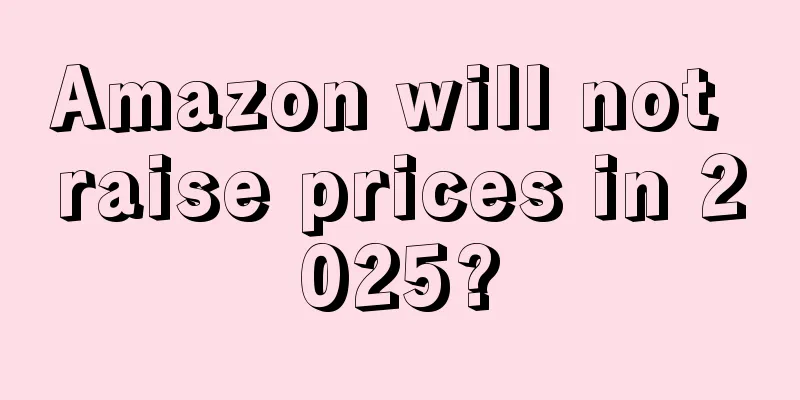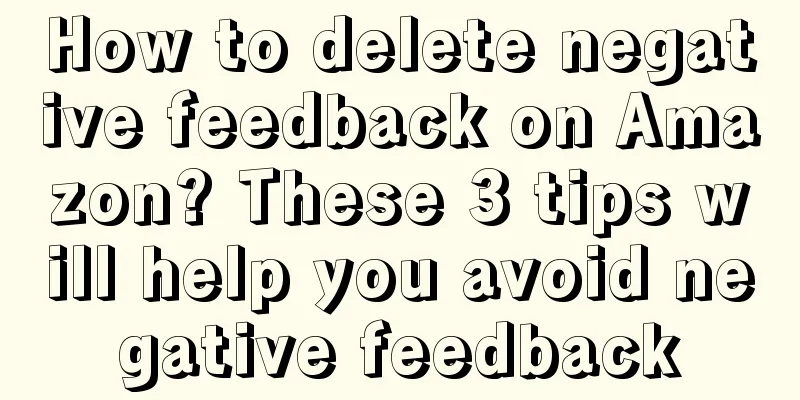Amazon will not raise prices in 2025?

|
Since the end of the US election, there have been more and more voices saying that the number of orders has dropped significantly and the traffic has declined. Some sellers even no longer have expectations for the Black Friday Cyber Monday event. However, judging from Amazon’s recently updated sales commission and Amazon logistics fee policies on the US site, sellers may not have a hard time in the future. 01 Amazon says it won't raise prices until 2025 Yesterday, Amazon updated its sales commission and logistics fee policies for the US site in 2025. Unlike in the past, Amazon not only did not raise various fees this time, but instead began to implement new policies such as exemptions, no price increases, and no introduction of new fee types to support the growth of new products. This made many sellers think they had made a mistake. Amazon said that it will not increase sales commissions and Amazon logistics fees on the US site in 2025, and will not introduce new fee types. Amazon will also reduce some fees and provide additional preferential measures to support the growth of new selections. Image source: Amazon announcement This is undoubtedly good news for sellers. Remember last year Amazon raised a number of fees, such as configuration fees, low inventory fees, etc., which caused sellers to complain. Judging from Amazon's updated policy, the fee changes in 2025 mainly cover three aspects↓ Waiver of the inbound placement fee for a specific period. Amazon will waive the inbound placement fee service fee for new parent ASINs created between December 1, 2024 and March 31, 2025. The first 100 eligible inbound items will not be charged. Reduce the service fee for large and oversized items . Starting January 15, 2025, for large and oversized items, Amazon will directly reduce the average service fee for single-point warehouse entry by $0.58 per item. Introducing more incentives. The platform will provide more fee discounts to new sellers through entry-level gift packages and Amazon Logistics new product warehouse discounts. At the same time, FBA delivery fees remain unchanged. As soon as Amazon’s policy was introduced, there was a lot of discussion among sellers. Although sellers’ feedback is mixed, this move by Amazon undoubtedly gives sellers some breathing room. The reduction of costs and fees has compressed sellers’ costs. No longer adjusting fees will also allow sellers to focus more on optimizing product portfolios, planning ahead for peak seasons to seize sales, and improving operational efficiency, without being constrained by rising costs. However, according to the platform's habits, even if the delivery fee has not increased, Amazon will often increase various fees in other aspects. Sellers still need to prepare in advance, especially when the number of orders has continued to decline significantly in recent times. 02 Before the peak season arrives, sellers' order volume continues to decline significantly. "The number of orders will definitely decline during the peak season" has become a norm, and the low period of order volume before Black Friday and Cyber Monday also caused sellers' moods to fluctuate. According to feedback from sellers, the trend of declining order volume had already started as early as October. At that time, the sales volume of some sellers decreased, while the order volume of some sellers was on the rise. The group of sellers with declining order volume has expanded again recently, especially since the US election. Most sellers have seen a decline in order volume or even no orders. Even though some sellers have increased their advertising budgets and spent a lot of money on advertising to attract traffic, their Acos are alarmingly high, but it is of no use. "The new products that had just improved a while ago are no longer selling," said seller Hiram helplessly. For products priced over $20, not only has the traffic in the category decreased, but the unit price in the advertisement has also increased from $3-4 to around $8. One can't help but sigh: With such involution, can everyone really survive? In fact, the recent sales fluctuations of new and old products and the explosion of Acos are affected by many factors. On the one hand, competing platforms such as Temu launched big promotions first, even offering extreme discounts. On the other hand, Americans were busy with the election, reducing or postponing shopping. Of course, another important factor is the change in the platform algorithm, which caused the advertising traffic to fluctuate, and the order effect was naturally stalled. Some sellers were affected by the growth rate of storage fees, so that the skyrocketing storage fees far exceeded the profits of the goods, and ultimately after a peak season, they were in a state of loss. However, some sellers have seen an upward trend in their orders. Many sellers on the European site said that "the number of orders has doubled in the past two days", "the number of orders is even higher than before as the big sale approaches", and "starting from the 7th, the number of orders has increased by 2-3 times compared to usual", so that sellers always feel that there will be some unexpected situations during this year's big sale. 03 The seller's new product list is hidden Some sellers have found that their new product listings have been hidden. When a third-party seller’s products are the same as Amazon’s own products, the third-party seller’s new product listings will be hidden by Amazon. According to sellers’ feedback, even if the price of their products is lower than that of Amazon’s own products, they will still be hidden unless the buyer takes the initiative to clear all filtering conditions. Image source: Amazon Forum Once the new product list is hidden, it will directly lead to a lack of product exposure, and the click-through rate and conversion rate will be reduced. The product will no longer be competitive, which will ultimately lead to a decline in product sales and even redundant inventory! Although Amazon's own-operated products are slightly more expensive, consumers are willing to pay for them because of the fast delivery speed. The disaster area this time is the sellers of book products. Amazon even sells a large number of out-of-print books, leaving no way for third-party sellers to survive. With the emergence of this situation, sellers feel that they have been stabbed in the back by Amazon and have begun to doubt Amazon's trustworthiness and fairness. Some sellers questioned that Amazon was using its platform advantages to force third-party sellers to make concessions, leaving no way out for sellers. Facing this situation, I have a few suggestions: 1. Optimize product listing pages Use higher-quality pictures and videos to attract consumers; dig out more long-tail keywords around the core traffic words of the product, bury them in the copy, and increase the probability of being retrieved. 2. On-site promotion If the profit margin of the product allows, you can do some "limited time promotions" or "flash sales" to attract consumers. 3. Increase investment in in-site advertising Use in-site advertising to expand traffic and increase the click-through rate of new products; you can also remarket to potential consumers, such as buyers who have browsed related products. So even if the platform does not stand on the side of the sellers, the sellers have to save themselves from the water and fire again and again, thousands of times, and keep themselves alive in the long run. |
<<: Are Amazon's new products being treated "unequally"?
>>: Things to note for Black Friday and Cyber Monday!
Recommend
How do Amazon sellers create their own private label products?
Close your eyes and think about what kind of e-co...
Are you using these Amazon reports correctly?
In the Amazon backend, you can see countless repor...
The lighting category is about to explode! New opportunities for Amazon sellers
After the resumption of work in the United States...
35 million orders in three years? The company has stopped selling and is now going public
Since 2022, cross-border large-scale sellers have ...
Use it right and it will take off! New rules for Amazon listings
text In order to reduce the problem of listing rem...
Sellers are collectively furious! Autumn sales are dismal, is Amazon "forcing" sellers to lower prices?
Normal, once there is data abnormality, such as s...
What is Amazon Brand Whitelist? Amazon Brand Whitelist Review
Amazon Brand Whitelist is a new channel for seller...
What is Guangzhou Huozhijia Warehousing Service? Guangzhou Huozhijia Warehousing Service Review
Guangzhou Huozhijia Warehousing Service Co., Ltd. ...
One person may die! FDA recalls this infant formula!
It is learned that due to bacterial infection, the...
2024 US e-commerce app rankings: Temu downloads surpass Amazon to top the list
It is learned that recently, according to the data...
FedEx to increase Christmas shipments by 10% as demand for express delivery surges in Puerto Rico
It is learned that according to foreign media repo...
Will Musk not let you down again? He promised to acquire Twitter by Friday!
It is learned that after months of changes and rev...
Walmart's last-mile delivery service GoLocal has surpassed 1 million deliveries!
<span data-docs-delta="[[20,"沃尔玛最后一英里交付服务G...
What is KuaTongDa? KuaTongDa Review
Shenzhen Kuatongda Logistics Co., Ltd. was establi...
What is Overgrowth? Overgrowth Review
Overgrowth is a brand and social proof tool design...







![[Tracking] How effective is Prime Day’s new gameplay this year?](/upload/images/67e709f7db9dd.webp)

